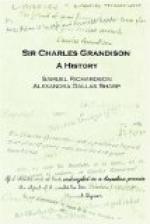He took great notice of the little boys. He dilated their hearts, and set them a prating; and was pleased with their prate. The doctor, who had never seen him before in the company of children, applauded him for his vivacity, and condescending talk to them. The tenderest father in the world, he said, could not have behaved more tenderly, or shewed himself more delighted with his own children, than he did with those brats of Mrs. Oldham.
Ah, Charlotte! And is it out of doubt, that you are the daughter of Lady Grandison, and sister of Sir Charles Grandison?—Well, but I believe you are—Some children take after the father, some after the mother!—Forgive me, my dear.
But I won’t. I have a great mind to quarrel with you, Harriet.
Pray don’t; because I could neither help, nor can be sorry for, what I said. But pray proceed.
Why, he made presents to the children. I don’t know what they were; nor could the doctor tell me. I suppose very handsome ones; for he has the spirit of a prince. He inquired very particularly after the circumstances of the mother; and was more kind to her than many people would be to their own mothers.—He can account for this, I suppose—though I cannot. The woman, it is true, is of a good family, and so forth: but that enhances her crime. Natural children abound in the present age. Keeping is fashionable. Good men should not countenance such wretches.—But my brother and you are charitable creatures!—With all my heart, child. Virtue, however, has at least as much to say on one side of the question as on the other.
When the poor children are in the world, as your brother said—When the poor women are penitents, true penitents—Your brother’s treatment of Mrs. Giffard was different. He is in both instances an imitator of the Almighty; a humbler of the impenitent, and an encourager of those who repent.
Well, well; he is undoubtedly a good sort of young man; and, Harriet, you are a good sort of young woman. Where much is given, much is required: but I have not given me such a large quantity of charity, as either of you may boast: and how can I help it?—But, however, the woman went away blessing and praising him; and that, the doctor says, more with her eyes than she was able to do in words. The elder youth departed in rapturous reverence: the children hung about his knees, on theirs. The doctor will have it, that it was without bidding—Perhaps so—He raised them by turns to his arms, and kissed them.—Why, Harriet! your eyes glisten, child. They would have run over, I suppose, had you been there! Is it, that your heart is weakened with your present situation? I hope not. No, you are a good creature! And I see that the mention of a behaviour greatly generous, however slightly made, will have its force upon a heart so truly benevolent as yours. You must be Lady Grandison, my dear: indeed you must.—Well, but I must be gone. You dine with us to-morrow, my brother says?




